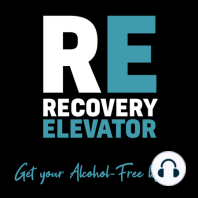36 min listen

RE 250: Is Sobriety all Unicorns and Rainbows?
RE 250: Is Sobriety all Unicorns and Rainbows?
ratings:
Length:
56 minutes
Released:
Dec 2, 2019
Format:
Podcast episode
Description
Dee took her last drink on January 17, 2019. This is her story. Update on the Alcohol is Sh!t book! The book is out! Pick up your paperback copy on Amazon here! You can get the Audible version here! On January 1st, 2020 the 4th Café RE group will open. There will be 2 in-person meetups in Australia this December. If you would like more info or would like to RSVP please email info@recoveryelevator.com. On today’s episode Paul talks about PAWS, or what he refers to as ‘healing symptoms. You can find a YouTube video on these healing symptoms, or PAWS, here. This period of experiencing these healing symptoms usually lasts anywhere from 3 – 6 months, but could last a little longer. You have 2 choices. The 1st choice is to keep drinking. With this choice there will be a painful progression and whatever emotions and physical repercussions you’re experiencing now will only be enhanced in time. The 2nd choice is to quit drinking and embark on the most heroic journey. This choice gives you options, and you don’t have to decide today. [14:50] Paul introduces Dee. Dee is 50 years old and recently moved to Albuquerque, NM. She works as a purchaser for the Federal Government. For fun Dee enjoys walking, hiking, biking, and meeting up with her fellow sober peeps. [17:20] Give us a background on your drinking. Dee was first introduced to alcohol by her parents as a child during the holidays. With high school came beer. Between high school and the age of 21 Dee really didn’t do much drinking. 21 years old rolls around and Dee got really good at drinking and socializing. Alcohol seemed to fix her feelings of not being enough. Always a tomboy Dee felt the guys didn’t really take an interest in her so the alcohol helped her become more flirtatious. At the age of 25 Dee became, what she called, a pro at drinking. Dee’s dad got sick and passed, this prompted her to switch from drinking beer to hard liquor, thinking this would stop her from becoming an alcoholic. A month later Dee’s husband died. Dee says she dove into the booze at this time and continued to drink heavily for years. [23:15] Do you feel that you properly grieved? Dee says she did not, that she didn’t know how to properly grieve. Alcohol helped her get through this time in her life, when she was in so much pain she didn’t want to live. It allowed her to sleep and it allowed her to manage getting up every day. [25:25] What role did alcohol play in your 30s and 40s? Dee was living in Florida and back to drinking “normal”. At 33 Dee moved to Atlanta and decided she needed to quit drinking, so she did. She quit for 7 months. She started going to AA, and although she didn’t feel it was for her she continued to go because that is what she knew to do at the time. After an offer of some free Dom Pérignon, Dee began drinking again. Fast forward to when Dee first joined Café RE. This was when her drinking really started to escalate, in 2018. Dee was in an unhappy marriage and although she didn’t want to drink, she couldn’t stop. Dee first joined Café RE in June 2018 and then thought she had her drinking under control and could moderate. She quit RE and drank for another 4 months before rejoining in January 2019. [31:50] Was there an emotional rock bottom? Dee says she fought with God, her higher power, over this for 25+ years. She says it was exhausting having one foot in church and one foot doing the drinking thing. So, Dee made the decision to face life without the alcohol. [38:15] You’re entering the scary and uncomfortable area in life, called the unknown, how is this going? Dee says it is going well and she is not afraid. [39:40] Has there been cravings? Having the mindset that drinking is not an option has helped Dee. Dee has a lot of options to reach out to people when she needs to, and she uses them. Connection and community are key. Dee is slowly building connections locally, in a healthy way.
Released:
Dec 2, 2019
Format:
Podcast episode
Titles in the series (100)
013: Expectations in sobriety and what needs to be addressed: Eric finds himself in a wheelchair at 6 months of sobriety and doesn’t drink. He talks about what he thought sobriety was going to be like and what to expect. by Recovery Elevator ?